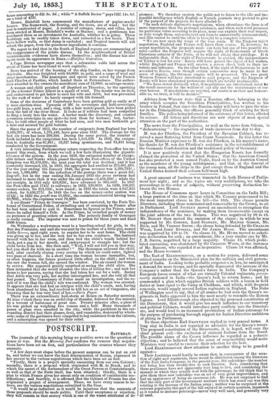A great amount of business was transacted in both Houses
of Parlia- ment last night ; and as the topics are very multifarious, we take the proceedings in the order of subjects, without preserving distinction be- tween the two Houses.
The House of Commons spent hours in Committee on the India Bill; a large portion of the time on that which Mr. COBDEN pronounced to be the most important clause in the bill—the 10th. The clause permits Directors, including those nominated and removeable by the Crown, to sit in Parliament. Lord JOCELYN moved an amendment to strengthen the
independence of the nominees, by making them irremoveable except on the joint address of the two Houses. This was negatived by 90 to 43.
Mr. BRIGHT then moved the omission of the clause ; in which he was supported by Mr. COBDEN, Lord STANLEY, MY. MILNER GD3S0N, Mr. Rica, and Mr. "VERNON SMITH ; the clause being defended by Sir CHARLES Wool), Lord JOHN RUSSELL, and Sir JAMES Hoe°. The amendment was negatived by 139 to 79. On clause 12, Mr. HUME moved to substi- tute declaration for oath ; an amendment, like a very similar one by Mr. J. B. SMITH; negatived by a large majority. Clause 13, which prohi- bited canvassing, was abandoned by Sir Cusiitss WOOD; at the instance of Mr. BRIGHT, who regarded it as inoperative. Clause 14 was affirmed, and the House resumed.
The Earl of ELLENBOROUGH, on a motion for papers, delivered some critical remarks on the Ministerial plan for the military and civil govern- ment of India. Looking to the probable exigencies in Ave, he anticipated a demand for more troops, and he specially deprecated the increase of the Company's rather than the Queen's forces in India. The Company's European forces consist of what are virtually Colonial regiments, perma- nently stationed in India—the Queen's look to return home ; and he commended a plan which supplies British soldiers with a lesson in field duties at least equal to the Camp at Chobham, and which, with frequent removals, would supply several Indian regiments in England. The Duke of Wellington used to say, that of all armies he had seen the Queen's re- giments in India appeared to him the most nearly to resemble the Roman legions. Lord Ellenborough also objected to the proposed constitution of the Directorate, that it would give too much influence to our transitory and political Cabinets, would introduce party conflicts into the Director- ate, and would lead to an increased prostitution of Indian patronage for the purpose of purchasing borough support for Indian Directors ambitious of sitting in Parliament. To these objections Earl GRANVILLE replied in very general terms. A long stay in India is not regarded as advisable for the Queen's troops. The proposed constitution of the Directorate, it is hoped, will cure the chief present evil—the exclusion of eminent Indians from the Board. The possible abuse of the Crown influence he regarded as a pedantic objection; and he believed that the sense of responsibility would make Ministers very careful to exercise their selection for the best. Lord ELLENBOROUGH drew attention to another thing to be guarded against— Their Lordships could hardly be aware that, in consequence of the crea- tion of eight new regiments, there would be duitnbuted among the Directors of the East India Company, in the present year, 384 cadetships—the number not being less than twenty-five to each Director.. Now, considering that these gentlemen have not apparently very long to live, and considering the mamier in which they usually deal with the patronage, he did think that to give them these new cadetships was an act of' very great improvidence, and Lad an appearance of being an enormous job. He was not surprised to find that the only part of the Government measure which has oozed out was this relating to the increase of the Indian army ; neither was he surprised at the extreme popularity this part of the bill enjoyed in certain quarters, inasmuch as it tended to increase patronage—never very well used, and generally very ill used.


























 Previous page
Previous page